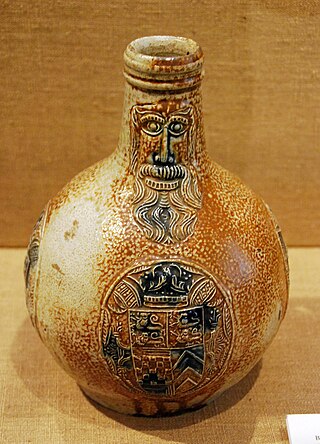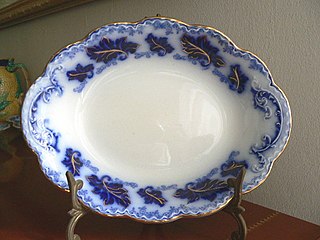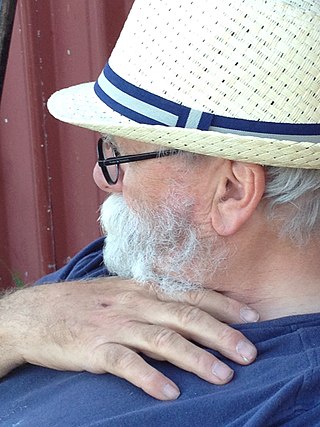
Josiah Wedgwood was an English potter, entrepreneur and abolitionist. Founding the Wedgwood company in 1759, he developed improved pottery bodies by systematic experimentation, and was the leader in the industrialisation of the manufacture of European pottery.

Clarice Cliff was an English ceramic artist and designer. Active from 1922 to 1963, Cliff became the head of the factory creative department.

Salt-glaze or salt glaze pottery is pottery, usually stoneware, with a glaze of glossy, translucent and slightly orange-peel-like texture which was formed by throwing common salt into the kiln during the higher temperature part of the firing process. Sodium from the salt reacts with silica in the clay body to form a glassy coating of sodium silicate. The glaze may be colourless or may be coloured various shades of brown, blue, or purple.

Transfer printing is a method of decorating pottery or other materials using an engraved copper or steel plate from which a monochrome print on paper is taken which is then transferred by pressing onto the ceramic piece. Pottery decorated using this technique is known as transferware or transfer ware.

Charlotte Rhead was an English ceramics designer active in the 1920s and the 1930s in the Potteries area of Staffordshire.

The Midwinter Pottery was founded as W.R. Midwinter by William Robinson Midwinter in Burslem, Stoke-on-Trent in 1910 and had become one of England's largest potteries by the late 1930s with more than 700 employees. Production of Midwinter pottery ceased in 1987.

Wedgwood is an English fine china, porcelain and luxury accessories manufacturer that was founded on 1 May 1759 by the potter and entrepreneur Josiah Wedgwood and was first incorporated in 1895 as Josiah Wedgwood and Sons Ltd. It was rapidly successful and was soon one of the largest manufacturers of Staffordshire pottery, "a firm that has done more to spread the knowledge and enhance the reputation of British ceramic art than any other manufacturer", exporting across Europe as far as Russia, and to the Americas. It was especially successful at producing fine earthenware and stoneware that were accepted as equivalent in quality to porcelain but were considerably cheaper.
Enoch Wedgwood (1813-1879) was an English potter, founder in 1860 of the pottery firm Wedgwood & Co of Tunstall, Stoke-on-Trent. He was a distant cousin of the famous potter Josiah Wedgwood, of Josiah Wedgwood & Sons but their two businesses were separate concerns.
Palissy was the trade name under which the English firm of A. E. Jones and Sons, of Stoke-on-Trent, marketed their china and pottery. The name was chosen as a tribute to Bernard Palissy, the famous French potter of the 16th century, creator of Palissy ware.
Portmeirion is a British pottery company based in Stoke-on-Trent, England. They specialise in earthenware tableware.

Johnson Brothers was a British tableware manufacturer and exporter that was noted for its early introduction of "semi-porcelain" tableware. It was among the most successful Staffordshire potteries which produced tableware, much of it exported to the United States, from the 1890s through to the 1960s. They were also important manufacturers of large bathroom ceramics. Some of its designs, such as "Eternal Beau", "Dawn", "Old Britain Castles" and "Historic America", achieved widespread popularity and are still collected today. The company's success was due in part to its ability to identify and follow trends that appealed to its customers in the United States, and in part to the high quality of its designs, produced by skilled artists.

Mintons was a major company in Staffordshire pottery, "Europe's leading ceramic factory during the Victorian era", an independent business from 1793 to 1968. It was a leader in ceramic design, working in a number of different ceramic bodies, decorative techniques, and "a glorious pot-pourri of styles - Rococo shapes with Oriental motifs, Classical shapes with Medieval designs and Art Nouveau borders were among the many wonderful concoctions". As well as pottery vessels and sculptures, the firm was a leading manufacturer of tiles and other architectural ceramics, producing work for both the Houses of Parliament and United States Capitol.

J. & G. Meakin was an English pottery manufacturing company founded in 1851 and based in Hanley, Stoke-on-Trent, Staffordshire.

Goldenhill is an area on the northern edge of Stoke-on-Trent, in the Stoke-on-Trent district, in the ceremonial county of Staffordshire, England. It is centred along the High Street, part of the A50 road that runs from south-east to north-west. It is about 1 mile (1.6 km) north of Tunstall and 1.5 miles (2.4 km) south-east of Kidsgrove.

Franciscan Ceramics are ceramic tableware and tile products produced by Gladding, McBean & Co. in Los Angeles, California, US from 1934 to 1962, International Pipe and Ceramics (Interpace) from 1962 to 1979, and Wedgwood from 1979 to 1983. Wedgwood closed the Los Angeles plant, and moved the production of dinnerware to England in 1983. Waterford Glass Group plc purchased Wedgwood in 1986, becoming Waterford Wedgwood. KPS Capital Partners acquired all of the holdings of Waterford Wedgwood in 2009. The Franciscan brand became part of a group of companies known as WWRD, an acronym for "Wedgwood Waterford Royal Doulton." WWRD continues to produce the Franciscan patterns Desert Rose and Apple.

Chell is a suburb of the city of Stoke-on-Trent in the ceremonial county of Staffordshire, England, that can be subdivided into Little Chell, Great Chell and Chell Heath. It lies on the northern edge of the city, approximately 1-mile (1.6 km) from Tunstall, 2 miles (3.2 km) from Burslem and 3 miles (4.8 km) from the county border with Cheshire. Chell borders Pitts Hill to the west, Tunstall to the south west, Stanfield and Bradeley to the south, with the outlying villages of Packmoor and Brindley Ford to the north and Ball Green to the east. Since 2011 the area has been divided into the electoral wards of Bradeley & Chell Heath, Great Chell & Packmoor and Little Chell & Stanfield.
Percy Shelley (1860–1937) was an English potter and a major force in developing Shelley Potteries. He was born in Longton, Staffordshire. He attended Owen's College, Manchester and then London University, where he gained a B.A. degree.

W H Grindley was an English pottery company that made earthenware and ironstone tableware, including flow blue. The company was founded in 1880 by William Harry Grindley, JP of Tunstall, Stoke-on-Trent.

The Ridgway family was one of the important dynasties manufacturing Staffordshire pottery, with a large number of family members and business names, over a period from the 1790s to the late 20th century. In their heyday in the mid-19th century there were several different potteries run by different branches of the family. Most of their wares were earthenware, but often of very high quality, but stoneware and bone china were also made. Many earlier pieces were unmarked and identifying them is difficult or impossible. Typically for Staffordshire, the various businesses, initially set up as partnerships, changed their official names rather frequently, and often used different trading names, so there are a variety of names that can be found.

Roger Michell was a British studio potter, artist, illustrator, poet and writer. Although foremost a potter, his deep insight, curiosity and his singular skills enabled him to work across a range of disciplines. He was a prolific reader, often reading several books a week. His mind was constantly working on future projects, he had a vivid and complex imagination which was evident in his work. He was most known for designing Walking Ware, a tea set on legs with over-sized Mary Jane shoes. During the nineteen seventies and eighties, thousands of these tea sets were sold, either hand made from Lustre Pottery studio or manufactured by Carltonware in Stoke-on-Trent.
















